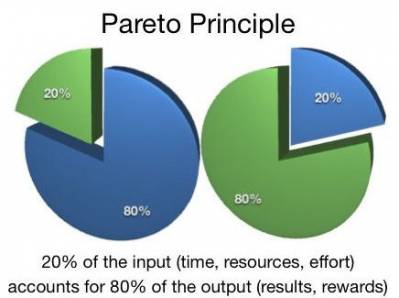|
Pareto Principle
|
|
| Teacher | Date: Friday, 08.04.2011, 17:24 | Message # 1 |
 Head teacher
Group: Admins
Messages: 375
Status: Offline
| Pareto Principle is a principle according to which 80% of our effrots are equal to 20% of the output we get. And only the last 20% of our efforts will bring us the rest 80% of the output. It means that you will never get everything at once. You need to push yourself to the limit, and only then you'll achieve success.
In Vino Veritas...
|
| |
|
|
| Nekavaen | Date: Sunday, 10.04.2011, 10:24 | Message # 2 |
 Head teacher
Group: Users
Messages: 340
Status: Offline
| I remember this principle. It says everything that takes place in our life is connected with this proportion 20:80. Our teacher in economics gave us an example: in a working social system 80% of people possess 20% of all treasures and income, and 20% of population have the rest – 80%. I believe the idea about efforts is true. When I have to cope with a difficult assignment, I often feel I first waste a large amount of time on thinking and overthinking, drawing sketches and writing drafts, asking others what they think about the future project. And only when a large scope of preparatory work has been done and my head is full of information and is about to explode, the Irradiation suddenly comes. I just understand at last how exactly to apply the knowledge and skills I have. After that I can quickly finish my work.
It is not human to be without shame and without desire. (Ursula K. Le Guin)
|
| |
|
|
| Teacher | Date: Sunday, 10.04.2011, 15:59 | Message # 3 |
 Head teacher
Group: Admins
Messages: 375
Status: Offline
| Nekavaen, you're luck to have such a teacher in economics. When I was a pupil at our economic lessons we didn't learn such interesting and really useful things and facts about business life.
In Vino Veritas...
|
| |
|
|
| Nekavaen | Date: Tuesday, 12.04.2011, 14:54 | Message # 4 |
 Head teacher
Group: Users
Messages: 340
Status: Offline
| Unfortunately, I had no lessons in economics at school. I first attended classes devoted to this subject this year at the Uni. Our teacher was a young man (he was only 24), but his seminars and lectures were fantastic. He told us a lot about the Pareto Principle. I know some more examples:
1) 20% of products give us 80% of profits (if we produce goods);
2) 20% of clients bring us 80% of earned money (if we render services);
3) 80% of the final price depends on 20% of raw materials.  There are also some non-economical cases. For example, 20% of criminals commit 80% of all crimes and so on.
It is not human to be without shame and without desire. (Ursula K. Le Guin)
|
| |
|
|
| Teacher | Date: Wednesday, 13.04.2011, 02:46 | Message # 5 |
 Head teacher
Group: Admins
Messages: 375
Status: Offline
| I tend to think that Pareto Principle can be used in any sphere of life such as the idea of the golden section in everything that surrounds us.
In Vino Veritas...
|
| |
|
|
| Nekavaen | Date: Thursday, 14.04.2011, 13:25 | Message # 6 |
 Head teacher
Group: Users
Messages: 340
Status: Offline
| I also think so. We can appeal to our imagination and logic and create similar proportions ourselves. For example, 20% of university subjects give me 80% of knowledge I will really need and use in the future.
It is not human to be without shame and without desire. (Ursula K. Le Guin)
|
| |
|
|
| Former-Teacher | Date: Friday, 15.04.2011, 08:31 | Message # 7 |
 Dean
Group: Admins
Messages: 504
Status: Offline
| Folks, can you explain in more detail this Pareto Principle? I am not sure I understand. Can you give examples? Does it always work?
Seagull, will you please find a video in the YouTube on Pareto Principle and upload it on our site!
|
| |
|
|
| Teacher | Date: Friday, 15.04.2011, 16:04 | Message # 8 |
 Head teacher
Group: Admins
Messages: 375
Status: Offline
| These videos can be intteresting and useful for you.
You can also get more information about the 20/80 rule here.
In Vino Veritas...
|
| |
|
|
| Rina | Date: Tuesday, 03.05.2011, 22:55 | Message # 9 |
 Union committee president
Group: Friends
Messages: 208
Status: Offline
| Quote (Nekavaen) 20% of university subjects give me 80% of knowledge I will really need and use in the future.
I'd rather say, 80% of University subjects give us 20% important information)))))))))))) 
|
| |
|
|
| Former-Teacher | Date: Wednesday, 04.05.2011, 14:50 | Message # 10 |
 Dean
Group: Admins
Messages: 504
Status: Offline
| Quote (Rina) I'd rather say, 80% of University subjects give us 20% important information))))))))))))
In terms of providing top-quality education, what do you mean? I'm an educator, you are a client - why do you want to get from me?
|
| |
|
|
| Rina | Date: Wednesday, 04.05.2011, 22:05 | Message # 11 |
 Union committee president
Group: Friends
Messages: 208
Status: Offline
| I didn't mean our English classes) and all the subjects aimed at studying languages))
I was speaking about subjects aimed at "broadening our horizons". Biology, for example. How can the knowledge of edible snail coupling process help me in my future work, I wonder?))))))
|
| |
|
|
| Former-Teacher | Date: Thursday, 05.05.2011, 09:19 | Message # 12 |
 Dean
Group: Admins
Messages: 504
Status: Offline
| It can help in many ways. Education does not mean your future work only. As a teacher of English, I wish I knew more of Biology, Physics, Chemistry, Maths, Ethnography, etc. This is important for me because I teach. For a manager at a car manufacturer, it is important to understand biological processes of any kind just because he is a human being with a long history and he needs to explore his professional subject matter in detail and be ready to establish comparisons with what exists in the real world. Sciences shape and build logical thinking skills, problem solving skills, designing skills, analytical skills, etc. Sciences are the basis for any profession. So, the knowledge of edible snail coupling process will help you look at things through the prism of hypothesis-based thinking. It can be any other piece of Biology or chemistry. This is another case of Pareto Principle - professional knowledge and general knowledge of how the world functions. Sorry, I don't know the best proportion!
ANother thing - How can watching an Anime cartoon help you become a human or a good professional! I think it can in many ways! It broadens my horizons! I have a huge world of knowledge and experience! My thinking abilities will have a chance to be everywhere, including Biology and snail and snake and worms that make holes in the ground when it rains to let the fresh air in. I understand how things work. I can explain it to my children. I will use the same principle if I work on a new type of porous bricks and try to make a understand its physical properties.
|
| |
|
|
| MissJane | Date: Saturday, 11.06.2011, 23:11 | Message # 13 |
 Union organizer
Group: Friends
Messages: 193
Status: Offline
| As for Pareto principle itself, I left my views on it here.
As for Biology and top-quality education, then they were incompatible. Our classes of biology did not even resemble any quality. I'm VERY interested in biology and I find it of prime importance in the life of EVERY person. BUT: this was not biology, this was chatting and sitting idle for the most time (let me speak frankly). Why can't we study biology in English, for instance? Or political science? Won't we benefit from such classes? This would be both English and "broadening our horizons". Am I wrong? Dear me!
|
| |
|
|
| Rina | Date: Sunday, 12.06.2011, 16:27 | Message # 14 |
 Union committee president
Group: Friends
Messages: 208
Status: Offline
| YES! That's exactly what I was talking about! If we study biology, let us study really necessary information! And as MissJane has mentioned - it's a great idea to study it in English! Why are we supposed to spend hours listening for "interesting facts" that are actually scrappy and dubious! That won't make us professionals neither in English, nor in biology!
|
| |
|
|
| Nastay62rus | Date: Tuesday, 08.01.2013, 08:52 | Message # 15 |
|
Union organizer
Group: Users
Messages: 102
Status: Offline
| The rule 80/20 in the most general view can look so: "If to place all subjects as their value, 80 percent of value are the share of the subjects making 20 percent from their total number while 20 percent of value are the share of the subjects making 80 percent from their total number".
|
| |
|
|












